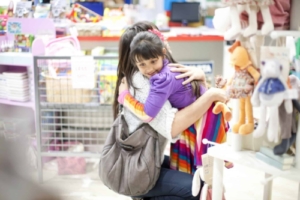
by SHARON SILVER
Recently I received a question on Twitter: “Do you have any suggestions for teaching a preschooler appreciation for [a] gift given to him, even if he doesn’t like it?”
When a child says “please” and “thank you” during the early years (18 months to age 3), it’s pretty much a rote expression, automatic and mechanical. If you think about it, you probably had to prompt your child by saying, “What do you say?” so he would remember to express thanks. At that age, most young children don’t fully understand the social graces behind saying “please” and “thank you”; they just know they’re supposed to say them.
At around ages 4 to 6, when a child begins going through the developmental phases that ignite independence and assertiveness, is when refusing to say “thank you” can rear its head. Not saying “thank you” isn’t really about misbehaving, it’s more about the fact that the child doesn’t have a fully formed habit of saying “thank you” when he receives something he doesn’t like. They’re not old enough to understand all the complexities of using social graces. They need to be taught, without punishment, so they can learn.
4 Proactive Ways to Teach Appreciation
Teaching a child to be grateful, like most things in parenting, is not a one-shot deal; it’s an ongoing process. Most parents are embarrassed when their child doesn’t say “thank you,” and rightfully so. However, if all you do is correct and punish after your child hasn’t said “thank you,” then the teaching moment easily can become a power struggle, not a lesson.
- Model, model, and model some more. Let your kids hear you say “thank you” a lot. When you’re given a gift or someone does something nice for you, say “thank you.” Say “thank you” to the cashier or the dry cleaner. Let your child know that when normal things happen, you express gratitude.
- Point out details. Make a habit of pointing out the little details you like about things. Share what you like in the pictures they draw, and compliment how nicely they’re eating, how quickly they got dressed, and how they stopped what they were doing so they could listen to you. This not only builds rock-solid self-esteem, but it also helps a child understand how to pick out one detail he does like from a gift he didn’t like so he can genuinely say “thank you.” After all, no parent wants to hear, “Saying ‘thank you’ for something I hate is lying!”
- Donate. We had a rule in our house: about a week before each birthday or holiday, the kids had to survey their toys and clothes and pick out a few things to donate to those who were less fortunate. To avoid possible last-minute hesitation about giving something away that was theirs, the kids were in charge of packing up the stuff and I was in charge of delivery. We also made sure to praise them for their generosity so they could see how the whole process worked.
- Practice makes perfect. This is especially true when it comes to teaching appreciation. Give your child opportunities to do nice things for others in the family. This teaches him about learning to extend kindness and about receiving appreciation in return.
If your goal is to release a respectful, well-mannered child into the world, then please know that refusing to say “please” and “thank you” does come up over and over again as they age. If you’re embarrassed, try saying, “Please excuse her, we’re working on social graces, again.”
The views expressed in this article are those of the author and do not necessarily represent the views of, and should not be attributed to, POPSUGAR.
https://www.popsugar.com/moms/How-Teach-Child-About-Being-Grateful-27334476


